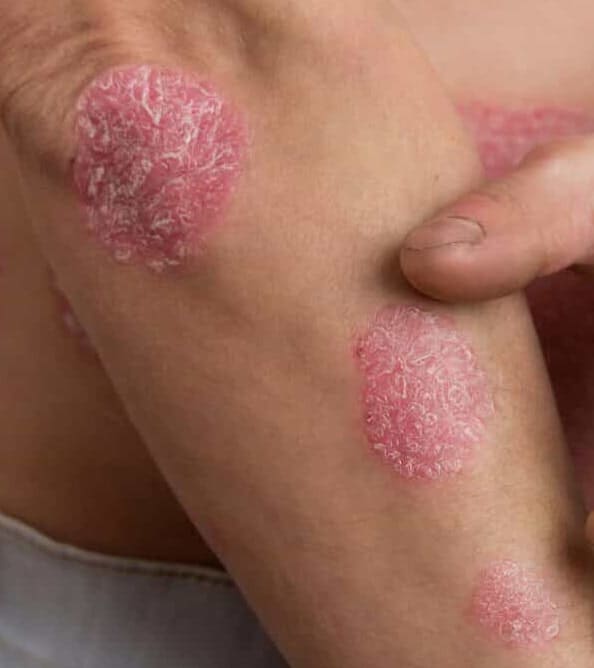Psoriasis - Know About Disease, Treatments, & Cost in Jaipur at Skinaa Clinic
Best Psoriasis Treatment at Skinaa Clinic
It’s essential for you to know everything about Psoriasis and how you can keep yourself and your loved ones safe from it. In this article we are going to explain What is Psoriasis, It’s Symptoms, Causes, Complications, and Everything You Need To Know about it.
What is Psoriasis?
Psoriasis is a skin condition that makes your skin form itchy, scaly patches, often on your knees, elbows, trunk, and scalp. It’s a common, long-lasting condition with no cure. It can be painful, interfere with sleep, and make it hard to concentrate.
In psoriasis, your skin cells grow too quickly. Normally, old cells are replaced by new ones, but with psoriasis, this happens much faster, leading to thick, red patches with silvery scales. It’s ongoing, but it can get better or worse over time. People of all ages can get psoriasis, but it often starts in young adults, between 15 and 35.
Psoriasis Symptoms
The way psoriasis shows its Symptoms up on your skin can vary from person to person. Some common signs and symptoms include:
Red patches with scales: These patches can be raised, usually red with silvery scales on top.
Itchy and sometimes painful skin: The skin in these areas can itch a lot and might hurt from time to time.
Dry skin that can crack and bleed: The patches can make your skin very dry, and it might crack and bleed.
Thick or pitted nails: Psoriasis can also affect your nails, making them thick or causing tiny pits on the surface.
Psoriasis Causes
The exact cause of psoriasis isn’t completely understood, but it’s thought to be a mix of genetic and environmental factors. Your genes play a role, so if someone in your family has psoriasis, you might be more likely to get it too. But it’s not just about genetics. Things in your environment can also be a Psoriasis Causes or make it worse. Stress, infections, like strep throat, and certain medications are some things that can set off or worsen psoriasis.
Psoriasis Types
Psoriasis comes in different forms, and how it appears can be different for each type. Here are some common types:
Plaque psoriasis: This is the most common type, causing raised, red patches with silvery scales on top. They can appear anywhere on your body.
Guttate psoriasis: This type often starts with small, scaly spots on your skin, often triggered by an infection, like strep throat.
Pustular psoriasis: This is a rarer form that causes pustules, like small pimples with pus inside. They can appear on your hands or feet.
Inverse psoriasis: This kind shows up in skin folds, like your armpits or groin.
Scalp psoriasis: Sometimes, psoriasis affects your scalp. This type, called scalp psoriasis, can be quite frustrating. It causes red, itchy, and scaly patches on your head, sometimes spreading to your forehead, neck, and areas behind your ears.
Psoriasis Risk Factors
Certain things can increase your chances of getting psoriasis. These Psoriasis Risk factors include:
Family history: If your family has a history of psoriasis, it might increase your chances of getting it too, thanks to your genes.
Stress: Being stressed or having a lot on your plate can trigger or worsen psoriasis.
Infections: Certain infections, especially strep throat, can set off guttate psoriasis.
Being overweight: Carrying extra weight can increase your risk.
Smoking: Smoking is known to be linked to psoriasis.
Medications: Some medicines can cause or worsen psoriasis symptoms, so it’s important to talk to your doctor about your medications.
Psoriasis Complications
Psoriasis isn’t just a skin issue; it can lead to other problems, such as:
Psoriatic arthritis: Some people with psoriasis can develop a type of arthritis that affects their joints, making it painful and hard to move.
Heart issues: Psoriasis is associated with a higher risk of heart problems, so it’s important to watch your heart health.
Emotional impact: Having visible psoriasis can be tough emotionally and might make you feel self-conscious or down. Taking care of your mental well-being is essential.
Higher risk of other autoimmune diseases: Psoriasis can increase your risk of other autoimmune conditions, where your immune system attacks your body by mistake.
Psoriasis Prevention
While you can’t always prevent psoriasis, there are steps you can take to reduce your risk and manage it better:
Stress management: Finding ways to relax and reduce stress can be helpful. Activities like meditation, yoga, or just taking some time for yourself can make a difference.
Weight management: Maintaining a healthy weight through a balanced diet and exercise is beneficial.
Lifestyle changes: Avoiding smoking and limiting alcohol consumption is a smart move for overall health.
Medication awareness: Be cautious with medications that may trigger or worsen psoriasis. If you have concerns about your medications, talk to your healthcare provider.
Psoriasis Treatment
A permanent cure for psoriasis is yet to be found, but various Psoriasis Treatment can help manage it effectively. These treatments can help control your symptoms and improve your comfort. Here are some common treatments:
Topical treatments: These are creams and ointments applied directly to your skin, which can help reduce redness and itching.
Phototherapy: Also known as light therapy, this treatment exposes your skin to ultraviolet light to improve psoriasis symptoms.
Oral medications: In severe cases, your doctor might prescribe medications you take by mouth to control the overactive immune response.
Biologics: These advanced medications target the immune system to control psoriasis, often used when other treatments haven’t worked.
Understanding psoriasis is essential to manage it better and improve your quality of life. By knowing what psoriasis is, how it shows up, why it happens, the different types, what can raise your risk, the complications it might cause, how to prevent it, and the various ways to treat it, you can take control of your condition. Working closely with your doctor is essential for finding the best approach for your unique situation. While psoriasis can be a challenge, with the right information and care, you can live a more comfortable life.


FAQ
When Should I See a Dermatologist for Psoriasis?
The simple answer to this question would be you should knock a dermatologists door as soon as you notice the signs of Psoriasis for the first time. As stated above, this condition is caused by the false response of your own immune system. And hence, it should be treated as soon as possible. If you leave this condition unattended, you may begin to feel more severe symptoms such as discomfort in the inflamed area, pain during doing routine work, swelling, and severe pain.
Who is the Best Doctor for Psoriasis in Jaipur?
At Skinaa Clinic, we have a team of the world’s best dermatologists and highly-trained staff who know how to cure different kinds of Psoriasis and how to treat specific patients as soon as possible. It is possible that in some patients, the treatment may take more time than the rest.
Rooms
Cured
In India
Practo
Become a Premium Skinaa Member
Apply for a Premium Membership at Skinaa Clinic and Avail Stunning Off on
Consultation Fees, Lots of Free Procedures, Get Preferred Support and Feel
Extraordinarily Exclusive.




